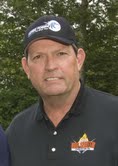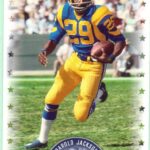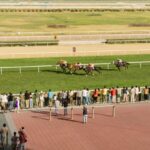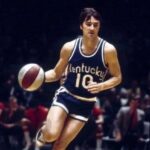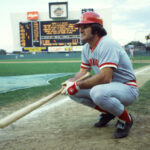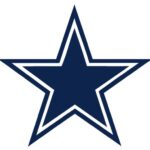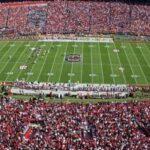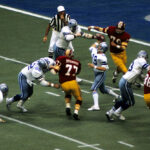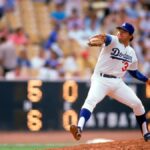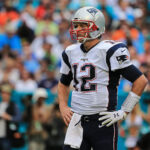Upstart Power Golf Championship Survives & Thrives in Rough Economy
Competition Founder John Mamoudis Determined to Buck the Odds and Succeed Once Again
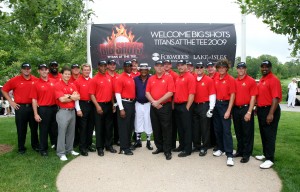
The 2009 Big Shots Titans at the Tee included many sports legends including Marcus Allen, Goose Gossage, Eric Dickerson, Jim Rice, Bruce Jenner and Joe Theismann.
Since 2008, as the Dow Jones Industrial Average pinballed from over 12,700 points to 6,443 back to 9,756, the sports business landscape has tilted: General Motors, Home Depot, FedEx, Sony Ericsson and Re/Max have all downgraded or completely forsaken long-running sports sponsorships, the Texas Rangers have gone bankrupt and the Arena Football League and the WNBA’s Sacramento Monarchs have folded.
Yet, despite the most inhospitable business climate in 70 years, a bold new sports start-up, “Big Shots Titans at the Tee,” has flourished. The astounding success of this long-drive power golf tournament is due entirely to its founder, John Mamoudis. His determination, passion and pocketbook have enabled Big Shots to buck the economic odds and — even without a major sponsor — soar beyond everyone’s expectations.
Since its debut in 2008, the event has become a favorite among competitors and fans alike, garnering outstanding television ratings and generating grassroots and media buzz.
Mamoudis, a resident of Virginia Beach, is a passionate golfer and former long-drive champion himself. After years of hearing “oooh,” “aaah” and “I’ve never seen anyone hit a ball that far,” he decided to try a long-drive competition. Mamoudis won the first tournament he played in, the 2004 Long Drivers of America regional qualifier. He snagged the regional, then the state, and was invited to the World Finals in the Senior Division in Las Vegas. After competing through the ranks, he returned to the World Finals for the next three years. He was hooked. (Unsurprisingly, his twitter user name is @longdriveman.)
“After five years competing with the Long Drivers of America, the only people I saw at tournaments were the competitors,” he says. “Athletes would spend thousands of dollars to get to an event where they could only win $500. I said, these guys are dedicated, and we need some exposure.”
So Mamoudis started “Big Shots.”
In its debut season, the tournament paired NASCAR celebrities with professional long drivers on the nascent HorsePower Tee Shot Tour. Speed, the cable channel, broadcast its first season.
“In 2009, we created the opportunity to take the tournament to the highest level on FOX Sports,” Mamoudis says. “We secured premium one-hour time slots for our shows on two consecutive Sunday afternoons in September.”
If, according to the old axiom, the value of a business is an expectation of future growth, then the value of Big Shots should be skyrocketing. At its new home on FOX, Big Shots averaged 1.52 million viewers, up from 187,000 on Speed the year before, according to The Nielsen Company. Not bad for a show competing head-to-head against established sports like the NFL, Major League Baseball and the PGA. And exceptional for an event that started from scratch, with no grassroots development programs such as little league to get it ingrained in the public’s sports consciousness.
Conventional golf, by contrast, is on the downswing: viewership, number of golfers and rounds played have all been trending downward since 2005, according to the National Golf Foundation.
Watching traditional golf, a 500-year-old sport that some historians date to King James II’s reign, can be dull. So soporific, in fact, comics joke that golf commentators whisper so as not to wake home viewers.
But Big Shots is not your 15th-century Scottish monarch’s golf. Like baseball’s home-run derby and basketball’s slam-dunk championship, the competition showcases the most explosive and exciting element of the game, the drive. Players use only one club, a USGA-approved driver. Ball speeds top 200 mph and distances exceed 400 yards. And unlike other long-drive tournaments, Big Shots isn’t just about explosive power; accuracy and consistency count, too. Players must hit balls within an actual golf hole fairway chalked off in ten-yard increments 200 to 400 yards from the tee box, like a football grid, and dotted with trees, bunkers and other obstacles.
The event’s accessibility to all types of players is one reason for its success. A skinny 5’9” competitor who consistently drives balls 350 yards accurately will beat a beefy six-and-a-half footer who blasts balls 500 yards but misses the grid.
“Accuracy is at a premium, every single ball counts, so you have to rein it in a bit and play smart,” says Sean “The Beast” Fister, a sports Hall of Famer and 22-year veteran of professional long driving competitions. “It actually pays to be consistent and long at the same time.”
Anyone from a pro golfer to a college golfer to a country club golfer to a couch potato with one club can compete and succeed. “There’s no reason that size or age should keep you from being a part of this,” says Phil Blackmar, a PGA Champions Tour professional. “It’s a great opportunity, a great fraternity.”
Although consistency is key in Big Shots, showmanship is never far behind. “But hey, once you get a few in the fairway for points,” Fister adds, “it gets fun because that’s when you can make a statement and knock the cover off the ball. This is what the people really want to see from a World-Class long driver — an absolute bomb that makes the crowd stand up and roar. Man, I love that!”
Successfully launching a new sports business amidst the chaos and tumult of the 2008 financial crisis would have been far beyond most people’s abilities, let alone imagination, but Mamoudis has always thrived in challenging situations. He credits his family for teaching him that drive, perseverance and hard work can overcome the most daunting obstacles. Every summer growing up, he helped his parents and siblings manage nine motels on the Virginia beach.
“I carried laundry, worked as desk clerk, managed the motels – I did it all,” he says. “No one in our household ever let the dust settle beneath our feet.”
Playing football, basketball and baseball at Great Bridge High School in Chesapeake, VA, Mamoudis went on to pitch for Miami Dade Community College, then the top-rated baseball program in the country, and was drafted by the Montreal Expos.
“My most exciting moment was in spring training, getting a chance to show that I not only could pitch, but could hit also,” he recalls. “In a game against the Mets, I pitched seven scoreless innings, striking out eight. I also hit two home runs.”
Unfortunately, a shoulder injury cut short his professional baseball career.
“That’s when the pie of life hit me,” he says, “and I went back to work for my parents. I wasn’t the kind of person waiting for someone to hand something to me. Never was.”
He enrolled at Old Dominion University in Norfolk and majored in business.
“It was a natural to be in the business world because I grew up in it.”
Heeding Milton Berle’s advice, “If opportunity doesn’t knock, build a door,” Mamoudis worked hard to build as many doors as he could. Early in his married life, he worked three jobs, construction by day, and tending bar and parking cars by night. And his hard work created new opportunities – his first business success came as a result of one of his night jobs.
“The disc jockey where I tended bar owned property that he wanted to sell,” he recalls. “He said I got this piece of land, and he let me look at it. My father-in-law wasn’t interested and thought I was too young – I was 21.” At that time, the prime lending rate was 16 percent. Despite the crushing interest rate, Mamoudis borrowed $650,000 and pre-sold all eight units.
“I made money on the deal, maybe a couple hundred thousand dollars. I approached my next job with the same aggressiveness.
“That was the start of my career.”
Since then, Mamoudis has built over 600 custom homes, townhomes, condominiums and apartments, and over 500,000 square feet of commercial office space as president and CEO of JTM Development Corporation, one of the largest residential development companies in Virginia.
Mamoudis seems to feed off adversity, whether on the baseball diamond, the boardroom or the tee box: as a teenager, pitching shutout ball despite a shoulder injury; as a young man, building a booming construction business despite sky-high interest rates; and now, creating a popular, prospering sports event despite an economy that’s bankrupted established teams and leagues. If not for Mamoudis’ grit, doggedness and energy, Big Shots never would have survived, let alone thrived.
“The game of basketball didn’t start out as the NBA,” adds Mamoudis. “I’m Mr. Naismith here. I have to keep refining the net. In order to keep going, I have to find a sponsor, someone who’ll say, ‘We’ll pick you up.’ I know all the assets I have.”
Though sponsors have been cautious, the rebounding economy should help Mamoudis find the right partners. This year, sponsorship spending is expected to grow by 4.5 percent to $46 billion worldwide, and now accounts for 25.4 percent of all corporate marketing, advertising and promotion spending, up from 17.6 percent last year, according to IEG Sponsorship Report.
“I think it will get better,” says Sylvia Allen, the noted sponsorship sales expert and New York University marketing professor. “People are setting their 2011 budgets now and in the last quarter and, because there is optimism, I believe more money will be freed up. And, yes, they will be more creative and willing to try ‘new’ things.”
Indeed, Big Shots’ uniqueness offers a fresh alternative for sponsors, helping them break through the clutter and noise of all the “same-old” sports clamoring for attention. And, because Big Shots is only in its third year, corporate partners can easily establish an identity with it. The earlier a sponsor signs on, the longer it can tie its image to an event.
“One example we talk about is how Winston partnered up with NASCAR a few decades back,” says Lisa Lucas, operations director for HorsePower Sports Marketing, Big Shots’ promotional arm, referring to the racing competition’s first name sponsor. “Winston was with NASCAR so long that many fans still refer to the top NASCAR division as the Winston Cup even though it’s been a number of years since a new sponsor came onboard.”
And Lucas points to Big Shots’ ratings success and celebrity competitors as bankable benefits for any sponsor.
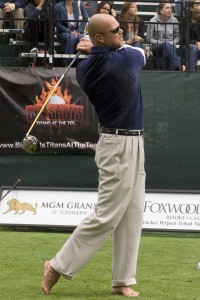
Two-time Super Bowl Champion QB Jim McMahon teamed with Brooks Baldwin to win the 2009 Big Shots Championship. McMahon earned the nickname of "Shoeless Jim" as he made all his drives barefoot.
“Not many sports products outside of the NFL, college football and certain MLB, NBA and PGA events were able to deliver the national television audience we did,” Lucas notes. “And we feel a very valuable component for our partners is the celebrity draw. Last year we had an Oscar-nominated actor, Mark Wahlberg, and an Olympic gold-medal winner, Bruce Jenner, to go along with mainstream recognizable pro football and baseball players, including Joe Theismann, Marcus Allen, Jim McMahon, Eric Dickerson, Jim Rice and Rich ‘Goose’ Gossage. Our A-list celebrities add a huge value for the business and social networking opportunities.”
This year, the tournament plans to reach out to talented golfers, in much the same way that American Idol has reached out to talented singers.
“It would be ideal if we could create a draw of a similar participant grouping as American Idol has done,” Lucas says. “They have proven that the ‘Average Joe’ can compete with anyone if given the equal opportunity.”
Mamoudis has spent more than $3 million of his own money on Big Shots, and is looking to sponsors to help keep the ball rolling.
“I’m a dreamer,” Mamoudis says. “If I were in the airplane business, I’d be designing planes. If it’s raining out, I’m grabbing my raincoat to play golf. I’m seeing the sun somewhere in that rainstorm. I’ve got this dream. I’m enthralled with it.”
With Big Shots, an exciting new property that’s a hit with power golfers, yet is accessible to a wide variety of players, and delivers outstanding TV ratings and A-list celebrities, Mamoudis will likely not need to wait long to find the right partners who see the value of his product.
